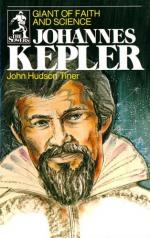|
This section contains 4,276 words (approx. 15 pages at 300 words per page) |

|
Johannes Kepler, the founder of modern astronomy, was born in Weil der Stadt, near Stuttgart. During his life he was a student of theology, teacher of mathematics and astronomy, assistant to Tycho Brahe, imperial mathematicus to the emperors Rudolf II and Matthias, and astrologer to the duke of Wallenstein. His principal scientific discoveries were the three planetary laws named after him, the principle of continuity in geometry, and the Keplerian telescope. He was also responsible for decisive advances in the theory of optics and in work that led to the development of the infinitesimal calculus, and incidentally he coined a number of terms whose paternity has been forgotten, including satellite (for the moons of Jupiter), dioptrics, focus (of a conic section), and camera obscura.
Significance of Kepler's Laws
Kepler's three laws of planetary motion postulate that the planets travel in elliptical orbits, one focus...
|
This section contains 4,276 words (approx. 15 pages at 300 words per page) |

|


